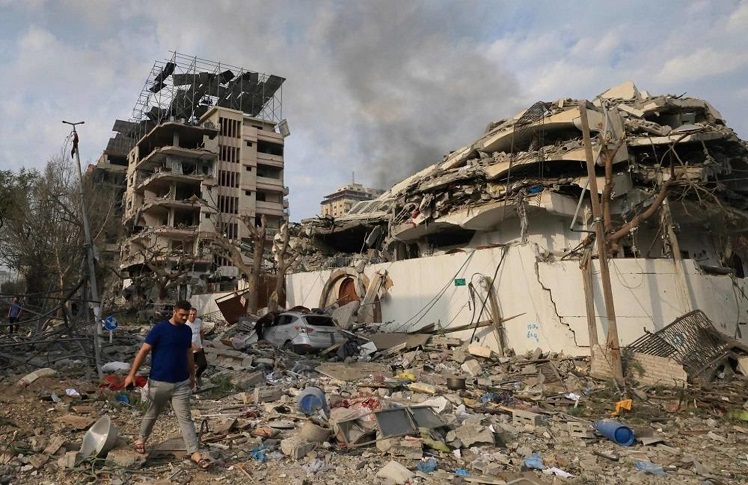
More than 180,000 Palestinians in the Gaza Strip have been placed in UN refugee camps as Israeli warplanes pound the tiny territory of 2.3 million people after their militant ruler Hamas launched an unprecedented offensive against Israel at the weekend.
Among them is 27-year-old Sabreen al-Attar. He sprang into action when he heard rockets rumbling over his farmland in Beit Lahiya, north of the Israeli border, on Saturday. He knew from experience that Israel's vengeance would be swift and severe.
Grabbing her child, al-Attar rushed to one of dozens of shelters set up in schools run by the United Nations Organization for Palestine Refugees in Gaza City. There, unprecedented power outages created steadily deteriorating conditions on Monday as food and water ran out. "If I run away, I will do it for my children," she said, her hands shaking. "Their life rests on my shoulders."
But residents say there is no real way out of Gaza, which has been under a suffocating blockade by Israel and Egypt for 16 years.
When war breaks out, as it has four times since Hamas seized power in 2007, even facilities considered safe zones by the UN are at risk of combat.
According to the United Nations, an airstrike directly hit one of its shelters on Sunday and damaged five other schools that opened on Monday. There was no immediate information on the casualties.
Al-Attar hoped to feel safe in the center of Rimal, a busy upscale commercial district in Gaza City that houses international media and aid agencies.
Until now, Rimal was not an immediate Israeli target, unlike border towns or densely populated refugee camps.
But while the Israeli army moved from neighborhood to neighborhood with rapid and intensifying airstrikes, heavy bombardment reached the heart of Gaza City, turning the affluent neighborhood into an uninhabitable desert of craters.
Rimal also suffered from Israeli airstrikes in the bloody Gaza war of 2021, but not to that extent. He said Israeli bombs that hit the flagship Islamic University of Gaza, government ministries and the Rimal Heights on Monday afternoon also blew out the windows of the al-Attar shelter and shattered glass everywhere.
Life there, filled with 1,500 other families, was full of danger and deprivation, but Al-Attar said she had no choice but to stay and told her sons - Mohammed, 2, and Nab, 7 - to stay away. from the windows. "It was a very, very difficult night," he said Tuesday. "We have no one else to go to."
The Rimal bombing and potential threats to UN protection of schools have highlighted the desperate search for refuge by Gazan civilians as safe spaces in the region are rapidly shrinking.
Before the Israeli army warned civilians on Monday that Rimal would be hit, families took to the streets, carrying whatever they could and aimlessly. At a press conference on Tuesday, Israeli military spokesman Lt. Col. Richard Hecht suggested that Palestinians try to leave through the Gaza-Egypt border crossing, an apparently impractical proposition.
Although Hamas officials operating on the Gaza side of the Rafah border crossing said on Tuesday that Gazans who registered in advance could enter Egypt, the number of travelers was usually small.
This led to congestion and waiting times of days or weeks, even during quiet times.
"There is never a plan B here," said Maha Hussaini, 31, as she watched residents of Rimal flood into her southern Gaza neighborhood just as the bombs began to fall there as well. So far, the number of dead in Gaza is about 700 and thousands of wounded. According to Gaza health officials, that punitive response killed more than 900 Israelis to the group's attack. More than 150 Israeli civilians and soldiers were captured.
Israel says major efforts are needed to target Hamas targets in Gaza to avoid civilian casualties. But the army has long carried out airstrikes in densely populated residential areas, which inevitably harmed civilians and civilian infrastructure.
Hamas officials announced the destruction of seven mosques and 15 civilian homes on Monday, killing several members of the same family. Israel's defense minister also ordered a "total siege" of the already besieged Gaza Strip, vowing to prevent food, water and fuel from entering the area.
"None of us even know what 'security' means in Gaza," said Hind Khoudary, 28, holed up in the luxury Roots hotel after the ear-splitting blasts.
"We don't deal with people who have (military) connections, these are people from the upper class, foreign organizations and media," he said of his loved ones. "But on days like this, the difference is zero."
Residents described a dangerous dance around Israel's heavy bombardment - fleeing home, crashing into relatives' apartments, fleeing again to UN schools, then resuming their search for safety.
"It's better than dying," said Muhammad al-Bishawi, 37, exhausted as he rushed between the UN refugee camp in Gaza City and his home in Beit Lahiya to get food and other supplies before returning. After Saturday's massive attack by Hamas, Israeli Prime Minister Benjamin Netanyahu warned civilians in Gaza of future horrors and promised to unleash the full force of the Israeli army.
"Get out now," he said, addressing Palestinians in the Gaza Strip. "Because we operate everywhere."
Khoudary listened to him as the airstrikes intensified, leaving him trapped in his home with nowhere to escape. "Why didn't he tell us where to run?" he asked. "Because we'd really like to know."
Leave a comment: (Your email will not be published)